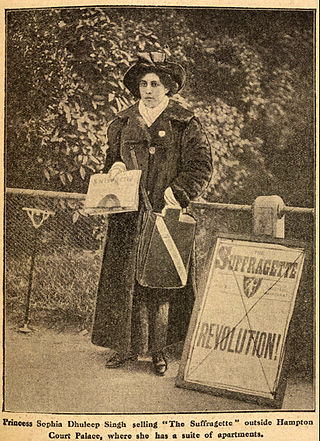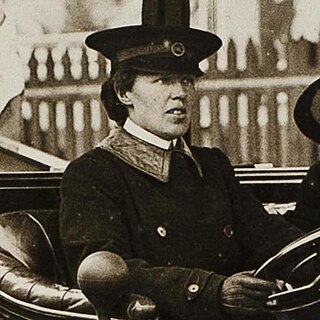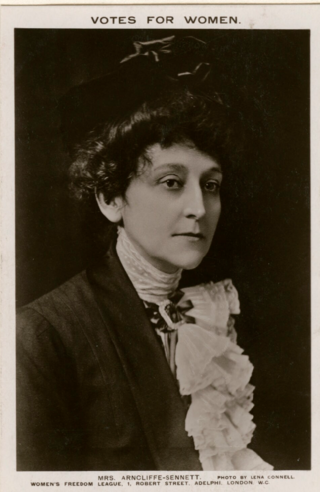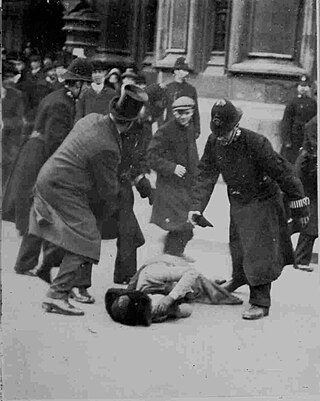Adeline Bourne | |
|---|---|
 | |
| Born | 1873 British India |
| Died | February 8, 1965 |
Adeline Bourne (January 1873 - 8 February 1965) was a British actress, suffragette and charity worker. [1]
Adeline Bourne | |
|---|---|
 | |
| Born | 1873 British India |
| Died | February 8, 1965 |
Adeline Bourne (January 1873 - 8 February 1965) was a British actress, suffragette and charity worker. [1]
Adeline Bourne was born in India on 8 January 1873. She was sent to private schools in Eastbourne and Blackheath, though after expulsion from three schools was educated by a governess. [2] She studied drama under Sarah Thorne, becoming a member of Thorne's company before leaving to tour America with Mrs Patrick Campbell. She then worked for J. E. Vedrenne and Harley Granville-Barker at the Court Theatre, and for Olga Nethersole. [3] At the start of the twentieth century she appeared in avant-garde and feminist plays. [2]
In 1908 she helped found the Actresses' Franchise League, [4] and served as its Joint Secretary. She set up the New Players Society in 1911. In 1915 she founded the British Women's Hospital, which raised £150,000 to establish the Royal Star and Garter Home for disabled soldiers. During World War I she served abroad as an officer in Queen Mary's Army Auxiliary Corps. [2]
Between 1915 and 1963 Bourne raised over £750,000 for different causes. For example, she raised £37,500 for the Elizabeth Garrett Anderson Hospital. In 1928 she was Vice President of the Association for Moral and Social Hygiene's Josephine Butler Appeal Fund. After World War II she started a women's employment organization to help women return to civilian jobs. In the mid-1950s she established the Wayfarers' Trust, a nursing home and hospital for older people. [2]
After Bourne's death in 1965 a fire destroyed her home in Thurston, Suffolk. Though her papers were rescued from the fire, they were subsequently destroyed in 2013. [5]

Emmeline Pethick-Lawrence, Baroness Pethick-Lawrence was a British women's rights activist and suffragette.

Charlotte Despard was an Anglo-Irish suffragist, socialist, pacifist, Sinn Féin activist, and novelist. She was a founding member of the Women's Freedom League, Women's Peace Crusade, and the Irish Women's Franchise League, and an activist in a wide range of political organizations over the course of her life, including among others the Women's Social and Political Union, Humanitarian League, Labour Party, Cumann na mBan, and the Communist Party of Great Britain.

The Women Writers' Suffrage League (WWSL) was an organisation in the United Kingdom formed in 1908 by Cicely Hamilton and Bessie Hatton. The organisation stated that it wanted "to obtain the Parliamentary Franchise for women on the same terms as it is, or may be, granted to men. Its methods are the methods proper to writers – the use of the pen." The organisation viewed itself as a writers' group rather than a literary society. Membership was not based on literary merit, but instead was granted to anyone who had published and sold a written work. Members also paid an annual subscription fee of 2s. 6d. The league was inclusive and welcomed writers of all genders, classes, genres, and political persuasions provided they were pro-suffrage. By 1911 the league was composed of conservatives, liberals and socialists, women of power and women who worked hard and members of the military. The league disbanded on 24 January 1919 following the passing Representation of the People Bill in February 1918, granting women over the age of 30 the right to vote.

A movement to fight for women's right to vote in the United Kingdom finally succeeded through acts of Parliament in 1918 and 1928. It became a national movement in the Victorian era. Women were not explicitly banned from voting in Great Britain until the Reform Act 1832 and the Municipal Corporations Act 1835. In 1872 the fight for women's suffrage became a national movement with the formation of the National Society for Women's Suffrage and later the more influential National Union of Women's Suffrage Societies (NUWSS). As well as in England, women's suffrage movements in Wales, Scotland and other parts of the United Kingdom gained momentum. The movements shifted sentiments in favour of woman suffrage by 1906. It was at this point that the militant campaign began with the formation of the Women's Social and Political Union (WSPU).

Princess Sophia Alexandrovna Duleep Singh was a prominent suffragette in the United Kingdom. Her father was Maharaja Sir Duleep Singh, who had lost his Sikh Empire to the Punjab Province of British India and was subsequently exiled to England. Sophia's mother was Bamba Müller, who was half German and half Ethiopian, and her godmother was Queen Victoria. She had four sisters, including two half-sisters, and three brothers. She lived in Hampton Court in an apartment in Faraday House given to her by Queen Victoria as a grace-and-favour home.

A suffragette was a member of an activist women's organisation in the early 20th century who, under the banner "Votes for Women", fought for the right to vote in public elections in the United Kingdom. The term refers in particular to members of the British Women's Social and Political Union (WSPU), a women-only movement founded in 1903 by Emmeline Pankhurst, which engaged in direct action and civil disobedience. In 1906, a reporter writing in the Daily Mail coined the term suffragette for the WSPU, derived from suffragist, in order to belittle the women advocating women's suffrage. The militants embraced the new name, even adopting it for use as the title of the newspaper published by the WSPU.

Kitty Marion 12 March 1871 – 9 October 1944) was born Katherina Maria Schäfer in Germany. She emigrated to London in 1886 when she was fifteen, and she grew to minor prominence when she sang in music halls throughout the United Kingdom during the late 19th century. She became known in the field for standing up for female performers against agents, corruption, and for better working conditions. She joined the Women's Social and Political Union (WSPU) in 1908, engaged in selling their newspaper Votes for Women and became a prominent suffragette in the United Kingdom for her participation in civil unrest protests including riots and arson. As a result, Marion was arrested many times and is known for having endured 232 force-feedings while on hunger strike in prison. She is quoted as saying “there are no words to describe the horrible revolting sensation.” When World War I started she emigrated to the United States, and there she joined the team on Margaret Sanger’s Birth Control Review. Although she used her tenacity and loud voice to get people to pay attention to her cause, she did not use violence as much as she had in the United Kingdom, although she was still arrested many times for advocating birth control.

The Actresses' Franchise League was a women's suffrage organisation, mainly active in England.

Una Harriet Ella Stratford Duval was a British suffragette and marriage reformer. Her refusal to say "and obey" in her marriage vows made national news. She bought the painting of Christabel Pankhurst by the suffragist Ethel Wright which was later donated to the National Portrait Gallery.

Vera Louise Holme, also known as Jack Holme, was a British actress and a suffragette. Born in Lancashire, she began working as a touring male impersonator when her parents could no longer support her. A talented violinist and singer, she also was a member of the chorus of the D'Oyly Carte Opera Company and later became a member of the Pioneer Players. After joining the Actresses' Franchise League, she became involved in the women's suffrage movement. She became the Pankhursts' chauffeur and the first professional woman driver in London.

Charlotte Augusta Leopoldine Marsh, known as Charlie Marsh, was a militant British suffragette.

Mary Elizabeth Phillips was an English suffragette, feminist and socialist. She was the longest prison serving suffragette. She worked for Christabel Pankhurst but was sacked; she then worked for Sylvia Pankhurst as Mary Pederson or Mary Paterson. In later life she supported women's and children's organisations.

Alice Maud Arncliffe Sennett also known with the stage name of Mary Kingsley was an English actress and suffragist and a suffragette, arrested four times for her activism.

Daisy Dorothea Solomon (1882–1978) was posted as a human letter in the British suffragette campaign using a quirk in the postal system to approach the Prime Minister who would not receive a delegation of women demanding the right to vote. Solomon was secretary to suffragette groups and imprisoned for protest, and went on hunger strike.

Inez Bensusan (1871–1967) was an Australian born Jewish actress, playwright and suffragette in the UK. She was a leader of the Actresses' Franchise League and the Jewish League for Woman Suffrage.

Ada Cecile Granville Wright was an English suffragette. Her photo on the front page of the Daily Mirror on 19 November became an iconic image of the suffrage movement.

Margaret Milne McConnachie Farquharson was a Scottish suffragette, MP candidate and leader of the National Political League campaigning for Palestine.

The Men's Political Union for Women's Enfranchisement (MPU) was a political society founded on 13 January 1910 in the Eustace Miles Restaurant in London as part of the women's suffrage movement in the United Kingdom.

Winifred Mayo born Winifred Monck Mason was a British actor, director, translator and suffragette. She was a co-founder of the Actresses' Franchise League and the secretary of the Six Point Group which called for social reform.